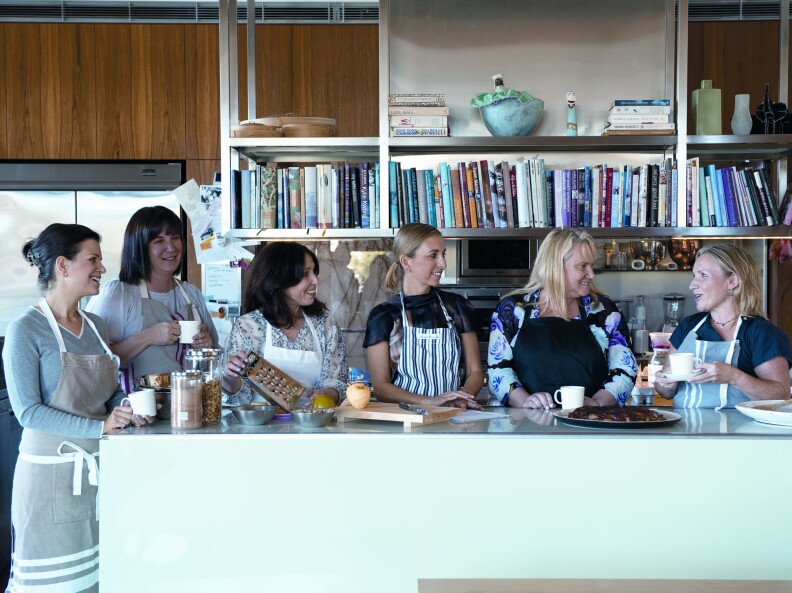With our free press under threat and federal funding for public media gone, your support matters more than ever. Help keep the LAist newsroom strong, become a monthly member or increase your support today.
From Down Under, A Paprikash To Warm You All Over

For many people, paprikash means winter. After all, it's a dish fit for cold, gray days: A belly-warming mix of meat and spices, it's the perfect cure for the doldrums of late January.
For Merelyn Chalmers, though, the classic Hungarian casserole recalls someone far dearer: her mother, Yolanda. A survivor of Auschwitz, Yolanda had rebuilt her life in Perth, Australia, after the war. "My mum was Hungarian," Chalmers explains. "We ate paprikash probably five nights a week. This was something that she just threw together when I wasn't feeling well."
Merelyn and her mother both considered it a "nothing special" dish, one that was just thrown together in a pressure cooker. But when Merelyn moved to Sydney many years later, she was surprised to learn it was also a favorite among other daughters of Hungarian women. "We have quite a large Hungarian population, and they had all grown up on the same dish."

Chalmers is now one of the women behind Australia's Monday Morning Cooking Club, a group dedicated to collecting recipes from the best home cooks in Sydney's Jewish community. The group very much wanted to include the recipe for Mum's Rice Paprikash – "mum" being Chalmers' late mother.
And her mom passed down a few tricks for her paprikash. Chalmers says, "My mother would put in a touch of garlic and a little bit of carrot to give it a little bit of extra sweetness – only a little."
Even half a world away and many years removed, Chalmers makes the dish herself several times a winter. And it still calls comforting memories to mind.
"For me personally, it's like mother's milk. It is tenderness emotionally, as well as tenderness in the bite of the meat." And, she adds, "It really minds me of my mum."
Mum's Rice Paprikash
Makes about 6 servings
80 mL (1/3 cup) olive oil
1 kg veal shin (off the bone), cut into large dice
3 large onions (500 g), very finely chopped
60 mL (1/4 cup) white wine
500 mL (2 cups) boiling water
2 cloves garlic, crushed
1 red capsicum, sliced
1 heaped tablespoon mild paprika
1/4 teaspoon cayenne pepper, or to taste
220 g (1 cup) long-grain rice
2 carrots, peeled and cut into chunks
1 small tomato, chopped
Heat the olive oil in a frying pan on a medium-high heat and fry the veal until very brown. Remove from the pan and set aside. Add the onions to the pan and fry until very brown, adding more oil if necessary.
Return the veal to the pan and add the wine and boiling water. Add the garlic, capsicum, paprika and cayenne pepper. Bring to the boil, then reduce the heat and simmer for 30 minutes.
Add the rice, carrots and tomato, stir to combine, then continue to simmer for a further 30 minutes, or until the veal is tender and the rice is cooked. Stir regularly and add more boiling water as required. Season to taste with salt and freshly ground black pepper.
Copyright 2023 NPR. To see more, visit https://www.npr.org. 9(MDA1OTI3MjQ5MDEyODUwMTE2MzM1YzNmZA004))
At LAist, we believe in journalism without censorship and the right of a free press to speak truth to those in power. Our hard-hitting watchdog reporting on local government, climate, and the ongoing housing and homelessness crisis is trustworthy, independent and freely accessible to everyone thanks to the support of readers like you.
But the game has changed: Congress voted to eliminate funding for public media across the country. Here at LAist that means a loss of $1.7 million in our budget every year. We want to assure you that despite growing threats to free press and free speech, LAist will remain a voice you know and trust. Speaking frankly, the amount of reader support we receive will help determine how strong of a newsroom we are going forward to cover the important news in our community.
We’re asking you to stand up for independent reporting that will not be silenced. With more individuals like you supporting this public service, we can continue to provide essential coverage for Southern Californians that you can’t find anywhere else. Become a monthly member today to help sustain this mission.
Thank you for your generous support and belief in the value of independent news.

-
Heavy rain from the early-season storm could trigger debris flows. Snow is also possible above 7,000 feet.
-
Jet Propulsion Laboratory leadership announces that 11% of the workforce is being cut.
-
The rock legend joins LAist for a lookback on his career — and the next chapter of his music.
-
Yes, it's controversial, but let me explain.
-
What do stairs have to do with California’s housing crisis? More than you might think, says this Culver City councilmember.
-
Doctors say administrator directives allow immigration agents to interfere in medical decisions and compromise medical care.







